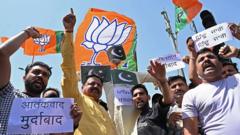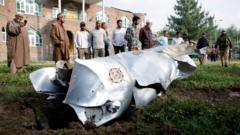The tragic attack highlights the delicate balance of power in the region and the looming threat of escalation between India and Pakistan.
**India Faces Crucial Decisions After Pahalgam Attack on Tourists**

**India Faces Crucial Decisions After Pahalgam Attack on Tourists**
Exploring the potential ramifications and India's military options following the deadly assault on tourists in Kashmir.
In a harrowing incident that claimed the lives of at least 26 tourists in Pahalgam, India grapples with the aftermath of the deadliest militant attack in Kashmir since 2019. The attack, targeting civilians on a leisure trip, not only signifies a brutal act but also challenges the semblance of normalcy that India's government has sought to portray in this disputed territory. As the nation mourns, the question arises: how will India respond?
Experts believe that the central government's response will be influenced by historical precedents and current pressures. Following the tragic attack, New Delhi has already initiated several countermeasures, including the closure of a key border crossing, the suspension of a critical water-sharing agreement, and the expulsion of diplomats. Defense Minister Rajnath Singh has promised a "strong response," emphasizing action against both the attackers and those orchestrating violence within Indian borders.
Analysts suggest that India is expected to deliver a decisive military response, although the timing and extent of this action remain uncertain. Military historian Srinath Raghavan noted that India's previous military interventions in 2016 and 2019 have set a high bar for retaliation, typically involving cross-border airstrikes. With the attack targeting civilians, public pressure on the government to respond is mounting. However, Raghavan cautions that the risks of miscalculation remain high for both nations.
Historically, India has reacted to attacks with surgical strikes. Following a deadly assault on Indian soldiers in 2016, the country conducted surgical strikes against militant positions across the Line of Control (LoC), and in 2019, it executed airstrikes on a militant camp in retaliation for the Pulwama attack. These actions conveyed strength but also risked escalating tensions with Pakistan.
Michael Kugelman, a foreign policy analyst, believes that the current high fatality rates may prompt a robust Indian military response, especially if any Pakistani involvement is perceived. While a military strike could effectively deter future attacks, it presents risks of igniting a conflict or crisis, emphasizing the precarious balance both nations navigate when nuclear capabilities are in play.
Further complicating considerations are the frayed ceasefire agreements along the LoC and the possibility that Prime Minister Narendra Modi might authorize military engagement. As regional dynamics shift, options such as airstrikes or limited military operations remain on the table, each characterized by the potential for retaliation and escalation.
Whatever course India decides to take, it is clear that any response will require careful strategizing. The long-standing India-Pakistan conflict obscures the horizon, necessitating precise military action that minimizes the chances of further conflict. Additionally, the recent attacks expose vulnerabilities within Indian security protocols, particularly considering they occurred amidst peak tourist activity, signaling lapses in protective measures in a territory under direct federal oversight. As the situation develops, the risk of further destabilization in Kashmir looms heavily over the region's fragile peace.
Experts believe that the central government's response will be influenced by historical precedents and current pressures. Following the tragic attack, New Delhi has already initiated several countermeasures, including the closure of a key border crossing, the suspension of a critical water-sharing agreement, and the expulsion of diplomats. Defense Minister Rajnath Singh has promised a "strong response," emphasizing action against both the attackers and those orchestrating violence within Indian borders.
Analysts suggest that India is expected to deliver a decisive military response, although the timing and extent of this action remain uncertain. Military historian Srinath Raghavan noted that India's previous military interventions in 2016 and 2019 have set a high bar for retaliation, typically involving cross-border airstrikes. With the attack targeting civilians, public pressure on the government to respond is mounting. However, Raghavan cautions that the risks of miscalculation remain high for both nations.
Historically, India has reacted to attacks with surgical strikes. Following a deadly assault on Indian soldiers in 2016, the country conducted surgical strikes against militant positions across the Line of Control (LoC), and in 2019, it executed airstrikes on a militant camp in retaliation for the Pulwama attack. These actions conveyed strength but also risked escalating tensions with Pakistan.
Michael Kugelman, a foreign policy analyst, believes that the current high fatality rates may prompt a robust Indian military response, especially if any Pakistani involvement is perceived. While a military strike could effectively deter future attacks, it presents risks of igniting a conflict or crisis, emphasizing the precarious balance both nations navigate when nuclear capabilities are in play.
Further complicating considerations are the frayed ceasefire agreements along the LoC and the possibility that Prime Minister Narendra Modi might authorize military engagement. As regional dynamics shift, options such as airstrikes or limited military operations remain on the table, each characterized by the potential for retaliation and escalation.
Whatever course India decides to take, it is clear that any response will require careful strategizing. The long-standing India-Pakistan conflict obscures the horizon, necessitating precise military action that minimizes the chances of further conflict. Additionally, the recent attacks expose vulnerabilities within Indian security protocols, particularly considering they occurred amidst peak tourist activity, signaling lapses in protective measures in a territory under direct federal oversight. As the situation develops, the risk of further destabilization in Kashmir looms heavily over the region's fragile peace.



















